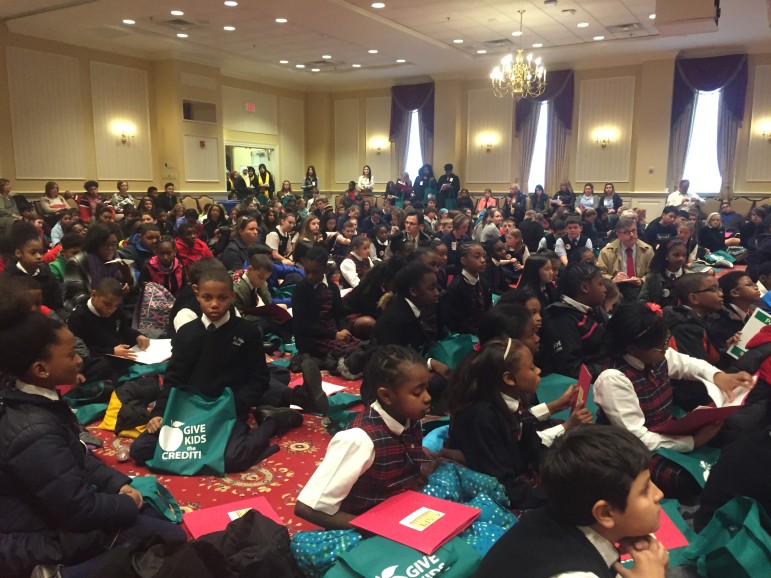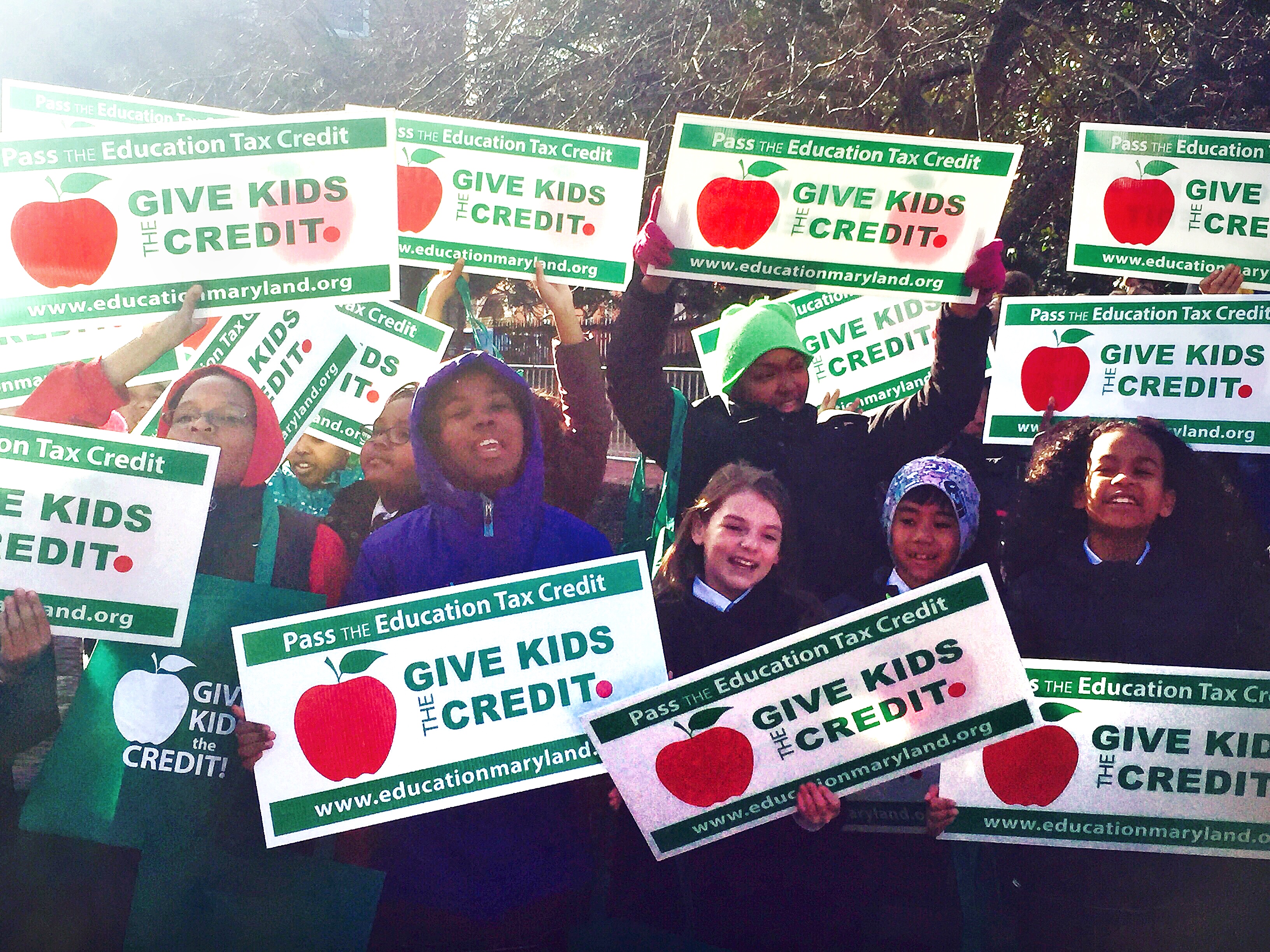By Alessia Grunberger
For MarylandReporter.com

Students gather to lobby for education tax credit. Photo by Alessia Grunberger, MarylandReporter.com.
Not many K-12 students could say they have rallied at the State House for a cause that has the potential to affect thousands of families in their state. That is the sort of civic duty that they read in their social studies textbooks.
But on Wednesday, 700 private school students from across the state saw the legislative process in action when they marched to the State House and urged lawmakers to pass the Maryland Education Credit bills.
Inspired by successful programs in 16 other states, the Maryland Education Credit in SB 706 is designed to address affordability and accessibility concerns that limit a family’s ability to send a child to a public or private school based on educational needs.
The long-sought legislation would provide high quality and diverse education for both private and public school students through the financial help of Maryland businesses, but has faced criticism that it diverts resources from public schools to private schools that serve only a few students.
The Maryland State Education Association that represents public school teachers and education workers, the NAACP, League of Women Voters, Maryland PTA, Maryland Association of Boards of Education are all opposed to it, according to a position statement on MSEA’s website.
Despite bipartisan support in the Senate, opponents have been able to repeatedly kill similar measures introduced over the last decade.
Tax credit on donations
In order to incentivize businesses to invest in education, the Maryland Education Credit would offer a 60% tax credit on donations to nonprofit student assistance organizations. These nonprofits would then be able to expand educational opportunities — such as scholarships, tuition assistance, after-school programs and special education services — especially for lower-income families.
Proponents of the Maryland Education Credit consider private schools a necessary complement to the public education system, and they repeatedly emphasized the need for private school support at the State House rally.
“We have a lot of needy families within our community. It’s hard for them to afford the education that our school provides,” said Momina Butt, a senior and Student Government Association president at Al-Rahmah School in Baltimore County. “I think it will really benefit the students and a lot of the families within our community.”
Other proposals include HB 1213 and the Hogan administration has put $5 million in next year’s budget for the program. The credits are awarded through the Department of Commerce with the total level of credits phased in over three years to $15 million in fiscal year 2018.
“We do have many of the best schools in the state, but we also have schools that are challenged,” Lt. Gov. Boyd Rutherford said to the sea of children and school administrators at the rally. “Parents who choose to send their children to nonpublic schools are doing so in the best interest of their children and in the best interest of the state.”
Bipartisan support
Sponsored by the Hogan administration, Sen. Ed DeGrange, Sr., D-Anne Arundel, Del. Antonio Hayes, D-Baltimore City, and Del. Dana Stein, D-Baltimore, the Maryland Education Credit has garnered widespread support across party lines.
To gauge public opinion, the polling firm Opinion Works conducted a telephone survey of 600 randomly-selected state registered voters. Two-thirds of participants supported the legislation and agreed that there should be a weighted emphasis on quality education.
“There’s bipartisan support for this proposal. There’s Republicans, there’s Democrats, there’s Christians, there’s Jews,” said Senate President Mike Miller. “This is everybody coming together to make a wrong a right. If you see a wrong happening and you don’t stand up and address it, then you’re just as wrong as the wrongdoer.”
The Ways and Means Committee will hear testimony on the Maryland Education Credit on March 7.




The Brooking Institution gave some low schools including two county schools earning an “F” grade. If schools could implement policies to improve and improvements came quickly, many would be willing to bear with the schools. However, many schools remain poor performers for very long periods of times. This leaves the parents in a very difficult position. Hopefully, this bill will help with this and provide parents with better opportunities to obtain the appropriate education for their children. Choice is a great thing.
I have two learning disabled children. Today, the first is a CEO in a management consulting firm with a Masters Degree. He recently was the COO in a $300 million firm with 3,000 employees. The other is a LT at a large well respected fire department. with a BS in Fire Science.
When we asked the local public schools about help for LD children (in their early grade school years), we were told that UNTIL they were 2+ years behind there would be no services. AND that every year services would only be available if and only if there was $$$ available in the budget.
Since these were OUR children and OUR responsibility, we “fired” public schools and spent $32,000 of our retirement money to put them into private schools for LD children. Sure it was expensive. But, absolutely, it was worth every “penny.” My wife drove 100 miles each day to take them to and from the school.
Every child deserves an equal “opportunity.” In our case, the public schools denied our children the opportunity for equality due to no fault of their own.
It was our responsibility as parents to do what was needed for our children.
That’s my ONLY point here.
Why the need to go to a private school IF the public schools are so great? This is just money being diverted from public education to support those already able to afford a private school education. These people don’t need more money. This is plain money suck from public education. Invest the money in public education so that ALL the schools are great schools. But really, in the whole scheme of things, less wealthy parents are seeking REFUGE for their children in private schools because of the overtesting (PARCC, MAPP, DIEBELs, KReadiness etc etc etc) scheme and implementation of the dreaded Common Core forced upon public education. The private education sector is exempt from participation in these federally mandated schemes.
Lisa,
The public schools aren’t that great !
They dumped giving their students a solid time tested education that only required mid term and final tests in each grade to reveal who was ready to move up to the next grade and who was ready to graduate and go on to college, etc
There were none of these tests when I went to grade/high school (1959-1971)…
Flunking a student and making him or her repeat a grade were the “remedial classes” of those days… Colleges and universities did not offer them and the SAT weeded out who was ready for higher education…
I firmly believe that parents who send their children to private/parochial schools should be able to deduct their tuition costs , dollar for dollar, from their state taxes since they are paying for something that they aren’t using…
State taxes are for the “greater good” of the state as a whole. I don’t travel any state roads in Somerset County, but my taxes are used to maintain those state roads. It is the obligation of the state to provide a fair and decent education for ALL of it’s children by way of a Public school system. It is a CHOICE to send children to private/parochial school.
As for choice,one can choose to send their children to public school also…
Homeschooling is such a choice…
Free up the monies used for public education ( which comes from all parents ) and give it back to the parents to send their children to the schools that they choose… This covers homeschooling as well…
I have no children in grade school, high school, or college… Yet,I pay for the “educational establishment”…
I should be able to deduct those taxes, dollar for dollar, from my income taxes, as should parents who choose not to send their children to non-governmental schools…
Roads are more necessary for trade, travel, and employment, as are rail, and air… There aren’t many alternatives…
But, government run schools have competition and the competition should have the same funding…
The tax credit proposed is the best option…
Very well said! I agree 100%! As a Teacher and a parent!